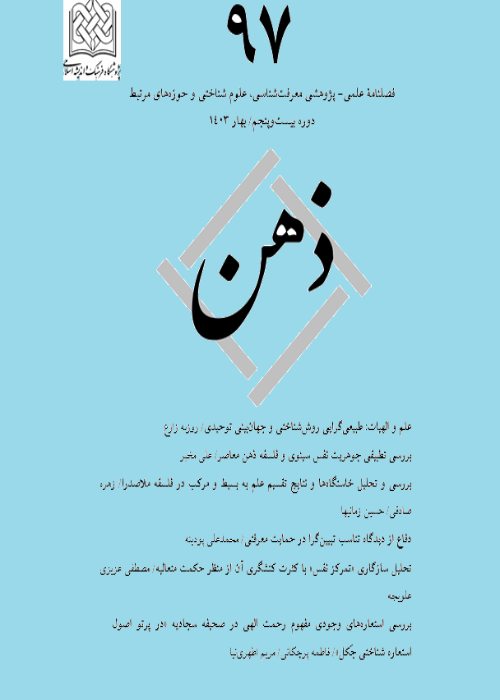An Approach to Belief upon Insufficient Evidence Based on the Assessment of Clifford's and James' Principles
Belief upon insufficient evidence is a permanent challenge in the discussion of justification that has been dealt with by different approaches of epistemologists. Clifford, as a representative of extreme rationalism, founded the theory of "agnosticism" based on solid rational and logical foundations while James, as a pioneer philosopher in pragmatism, had a critical outlook on that approach and attempted to solve this challenge by his pragmatic principles and raised the theory of "the will to believe''. Based on the review of philosophical tenets of the above two thinkers, the present article aims to evaluate their propositions and also introduce a new approach in this regard.
In order to access the valid data, library method was used to study, compile, arrange, and classify information relevant to the subject under study and then, research note-taking lists were prepared by comparative classification and thematic coding. For inferencing the results and proposing new ideas, logical analysis was used with a critical and comparative approach.
Clifford who was born in the age of ignorance, superstition, and illusion felt committed to defend rationality as the strongest means to discover truth and warned against consequences of people's avoidance of reason. However, the essence of some epistemological propositions is in a way that it is not feasible to gather definite evidence to make a rational decision. There is no reasonable solution in this term and thus Clifford, regardless of the significance of many propositions that have no sufficient evidence, presents the theory of agnosticism. His doctrine is not only criticized as being inefficient, impractical, and self-contradictory but also underestimates human power. He just acknowledges rational faculty and attributes more power and potential to that than it really has.James acknowledged epistemological, emotional, and theological realms for humans and claimed that the epistemological aspect which is under the control of rational power is a small segment of human existence that is per se a subcategory of the emotional realm. According to his theory, the power of the emotional realm in perception and analysis of epistemological propositions with no evidence is more than that of the rational power. So human endeavor to discover and produce evidence should trust sentimental power, will, and whatever chosen by them. In the next stage, truth recognition can be achieved based on what is trusted. In James' view, the most basic and influential beliefs in human life have no evidence so agnosticism is not only facilitative but also problematic in this regard. He believes that truth and usefulness are compatible with each other and there is no independent reality out of human existence that needs to be discovered by evidence so whatever is favorable, useful, and efficient is considered reality. Accordingly, neither reason per se saves humans from ignorance nor evidence is the only means to discover reality. Instead, what matters is the perception of usefulness and satisfaction. Confusion between truth and usefulness, underestimating the importance of truth to perceiving favorability, indefensible relativism and immersing into illusion are some major critiques to James' ideas.
According to the author's view and by an innovative approach, although a preposition upon insufficient evidence is not claimed to be true, it can be accepted or pretended to be accepted in order to use its results and consequences. Based on this approach, when we confront a proposition that does not have sufficient evidence, we react as if it is accepted and use its practical outcome to fulfill our vital needs. Therefore, we practically act as if there are definite reasons for our performance while theoretically it has no confirmed reasons and no unjustified belief can be claimed as truth. As a result, we neither neglect our basic needs nor consider the accepted or seemingly accepted issues as the reality or truth.
Acceptance , agnosticism , will , Rationalism , Pragmatism
- حق عضویت دریافتی صرف حمایت از نشریات عضو و نگهداری، تکمیل و توسعه مگیران میشود.
- پرداخت حق اشتراک و دانلود مقالات اجازه بازنشر آن در سایر رسانههای چاپی و دیجیتال را به کاربر نمیدهد.


